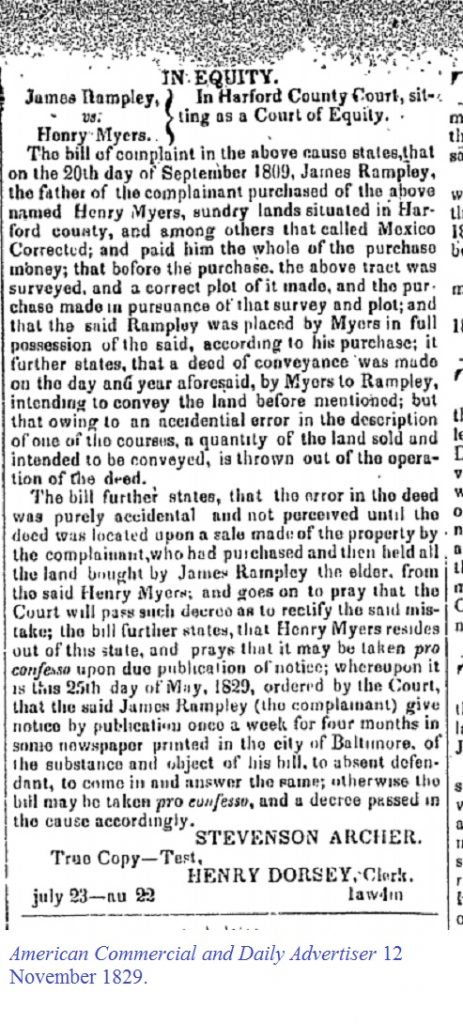
There are several reminders from this 1829 legal notice published in a Maryland newspaper.
Extra Details in Court Records
The first is that court records can contain a variety of information. This 1829 case was heard in the Harford County Court and centered around an incorrect legal description for a piece of property the plaintiff’s father had purchased twenty years before the case was heard.
It even names the father.
The father of the plaintiff is only mentioned because it was the deed transferring the property to the father that was incorrect in the first place. It’s fortunate that the relationship is even stated at all. If James Rampley, Junior, actually purchased the Myers property from James Rampley, Senior, there really did not need to be a reference to their relationship. Referencing them as Senior and Junior would have been sufficient to distinguish between them in the various court filings and in this legal notice. Sometimes we just get lucky and a clerk includes an additional tidbit of information.
Had Senior gifted the property to Junior or willed it to him, then the parent-child reference might have been included for additional clarification as to the transfer. But if the purchase was one for cash (which this legal notice suggests by indicating it was purchased), the parent-child relationship does not need to be indicated.
Of course the use of the word “purchase” may not technically be correct or it may actually refer to a purchase for a token amount. The actual deed would answer that question.
Dead Named In Newspapers
The legal notice does not mention it, but James Rampley, Senior, died in 1817. His name appeared in this notice twelve years after his death–and not in a reference to his estate being settled.
Former Residents Named in Paper
The legal notice indicated that Henry Myers resided outside the state of Maryland. Given the location of the property in question, he was sued in a Harford County court. It is possible that the actual court records provide more information on Henry’s residence in 1829. Or not.
It’s not like they could search for him in 1829 they way we could today.
The court records will be focused on Rampley’s title to the property in question and in describing it correctly. There may be testimony or depositions that reference other members of the families involved–including James. That testimony may give other information regarding the Rampley or the Myers family.
Maryland is a metes and bounds state. If your relative owned real property in a state that used that method of real property description, it may be worth your time to check for court records. The Rampleys were not the only people whose deeds included descriptions that were incorrect.

No responses yet